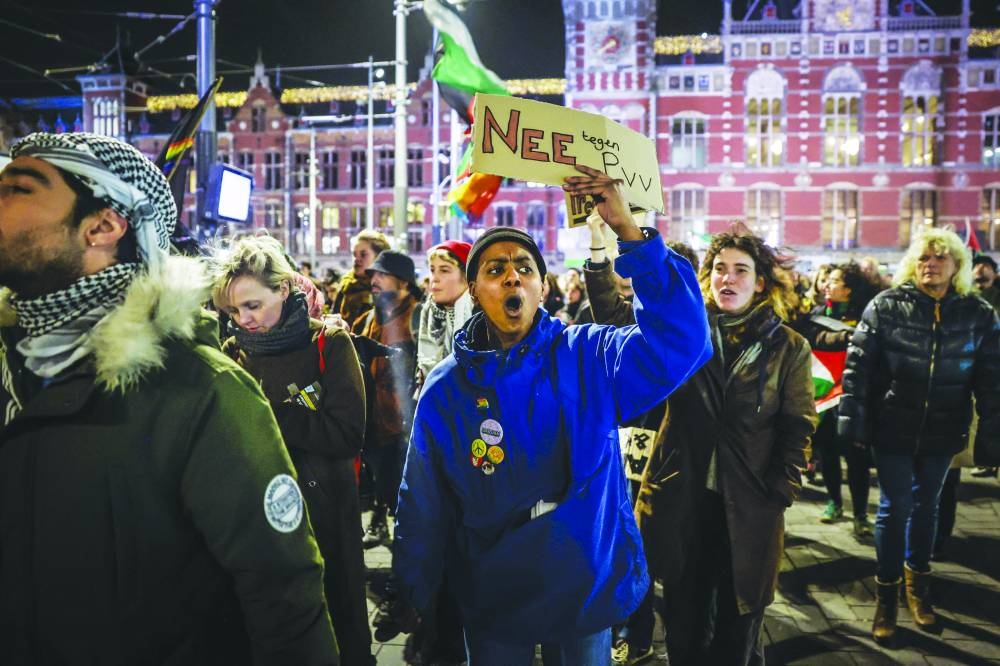The far-right, anti-Islam party of firebrand politician Geert Wilders has won a stunning victory in the Dutch election, near-complete results showed, a political bombshell that will resound in Europe and around the world.
Wilders and his eurosceptic Freedom Party (PVV) beat all predictions on Wednesday night by winning 37 seats out of 150 in the Dutch parliament, well ahead of a Labour/Green combination and the outgoing Prime Minister Mark Rutte’s conservatives.
Dutch Muslims expressed shock yesterday.
“These election results are shocking for Dutch Muslims. We did not expect such a party with a programme that is against the basic principles of the rule of law to be so big,” said Muhsin Koktas of Muslim organisation CMO.
Muslims make up around 5% of the Dutch population of almost 18mn people.
“It was a blow I have to process,” Abessamad Taheri, a 45-year-old community worker in the multi-ethnic Schilderswijk neighbourhood in The Hague told Reuters.
Mehdi Koc, a 41-year-old insulation installer, said he was shocked by the swing to the PVV, while Taheri said the vote sent different messages to Muslims, although the overwhelming emotion was of disappointment.
“In part the message is that many people are xenophobic and don’t want foreigners or Muslims. But another message is that people are very disappointed in 13 years of Rutte,” he said.
However, Taheri, a member of the Labour party, said he could not really separate that from all the “nasty things” Wilders had said about banning head scarves and closing mosques.
After his surprise win, Wilders said he wanted to be prime minister for all Dutch people, but that appeared to do little to assuage concerns about what he might do later.
“If you say yes to Wilders now, than you will have to say yes later when he closes down all the mosques, because then you cannot go back,” Koc said, warning that Wilders will not lose sight of his eventual goals.
Some in the Netherlands think that the Dutch system of coalition government means Wilders will have to compromise on his most radical views, as political analysts also predict.
“He will not make the laws alone (other parties) will join and they have to co-operate,” Kemal Yildiz, 54, said. “It will be fine.”
The shock victory of Wilders’s eurosceptic party in Dutch elections sent a political tremor through Brussels, seven months ahead of crucial EU elections.
Despite Wilders’s promise to hold a “Nexit” referendum, pro-European parties do not yet fear that the Netherlands is going to follow Britain in quitting the European Union.
However, his first place finish in a core member of the union is a reminder that populist parties are expected to grow in strength in next year’s European Parliament elections.
“The European Union is in danger of death from within and without,” socialist MEP Raphael Glucksmann said in an interview with the France 2 network, warning that Russia’s President Vladimir Putin would be celebrating Wilders’s triumph.
“Elections take place at regular intervals in the member states. And this does not, per se, put in doubt in any way the membership of any country to the European Union,” European Commission spokesman Eric Mamer said. “We continue to count on the Netherlands strong participation in in the European Union, obviously.”
Wilders’s PVV may not be able to build a coalition to make him prime minister so he can join the other 26 EU members at their summits.
And his hardline plans to expel immigrants would be unlikely to survive legal challenges in the Dutch or European courts.
However, Europe’s support for Ukraine, grand plans to fight climate change and efforts to build a joint strategic position in the face of crises like the Gaza war could be endangered.
European elections to be held in June will be a new test of Wilders’s popularity.
The Netherlands is the seventh most populous EU country and its MEPs – along with right-wingers from countries like Poland, Italy, France and Hungary – could form a powerful group.
“We can expect at least a consolidation of right-wing populists, even an increase in their number of seats in the European Parliament, said Nathalie Brack of Brussels Free University.
The PVV does not have any seats in the current parliament, but next year they could join the National Rally (RN) of France’s Marine Le Pen and Germany’s AFD in the assembly’s Identity and Democracy group.
That is what the European far-right hopes for.
“Bring on June 2024!” exclaimed French RN MEP Jordan Bardella, in a social media post hailing Wilders’s win as a “beautiful defeat” for supporters of immigration and Islamism.
The larger ECR group of eurosceptic parties, currently dominated by Poland’s PiS and Spain’s Vox, could also benefit from a populist surge, the political scientist Brack told AFP.
The ECR already has 67 seats and could pass the Greens, currently on 72, thanks to what she called “a generalised discontent” with traditional centre parties.
“There is even the chance that ECR becomes the third group in parliament if, for example, the liberals are punished at the polls,” she said.
Traditionally, European legislation moves forward backed by a broad coalition of the pro-European centre right and centre left.
If such groups did not have a working majority, law-making could grind to a halt and the most ambitious plans of supporters of the “ever closer union” would be halted or reversed.

People take part in a solidarity action against exclusion and discrimination at Rotterdam's Dam square yesterday, one day after the victory of Wilders's far-right eurosceptic party in Dutch elections.
